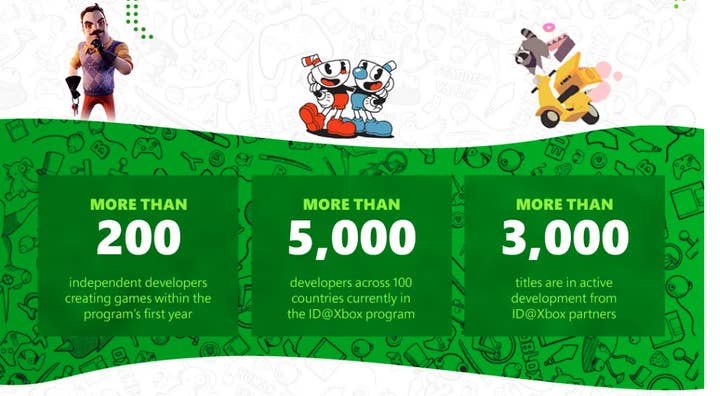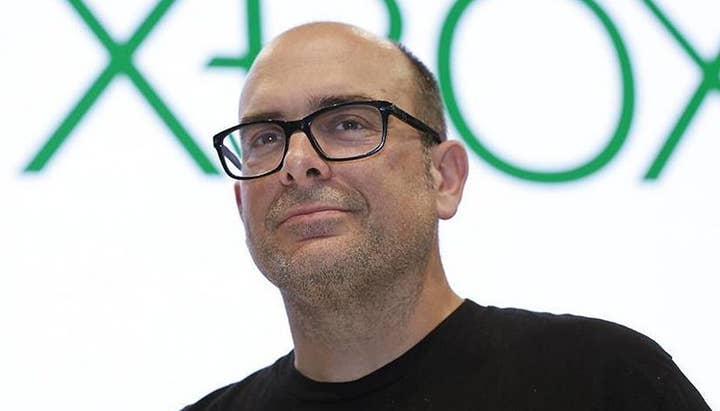Xbox’s Chris Charla: Game Pass isn’t disruptive
ID@Xbox chief says business concerns over subscriptions are normal and healthy
Ahead of our interview with ID@Xbox director Chris Charla, we asked a few independent developers and publishers how they were feeling about Xbox.
The responses were largely very positive. The ID@Xbox programme – now celebrating its tenth anniversary – continues to be a success, and teams had nothing but good things to say about how Xbox works with them. But, as you'd expect, there were a few questions and concerns. And every single one of those was about one thing: Game Pass.
"Business people being worried about the direction of the business is a perfectly normal, natural, and healthy thing," Charla tells us during last week's Game Developer Conference..
"When free-to-play came to consoles, there were a lot of people who thought this was going to completely change everything, every game will become free-to-play and nobody will be able to get people to purchase a video game again. But that's not what happened. But were those concerns valid, rational, normal, and healthy? Absolutely. It is all our jobs in the games industry to take those concerns seriously, to think about them, and work together to make the industry work."
Charla says that concerns over subscriptions and how it might disrupt the games business isn't something that Xbox is seeing in its data.
"I wouldn't describe it as disruptive, because I don't think it is in the way that like Uber came in and got rid of all the taxis in that industry," Charla tells us.
"People still buy a lot of games and they still buy a lot of games on Xbox"
"It's additive. People still buy a lot of games and they still buy a lot of games on Xbox. They buy games through Game Pass at a discount, which is what they get as members. And so I don't think Game Pass has been a disruptive business model, it's been additive in a really positive way. And we as an industry needs to look at more of those additive business models. A bit like digital distribution, that may have been somewhat disruptive to the retail space, but it was ultimately additive because not every game needed to be of the size to justify being on a disc."
The introduction of digital downloading is an interesting comparison, because turn back the clock 15 years, and the argument was that digital was additive to the traditional retail business. Back then, most players bought games in boxes, so if there was suddenly a lot of talk and excitement around a specific game – perhaps because of a digital promotion, or the introduction of some DLC – it would result in a sales bump at physical retail.
That all changed when digital downloading started to accelerate and took a larger share of the market. So although Game Pass may be additive right now, is Charla convinced that will remain the case in the future?
"I do think it will," he says. "We see Game Pass players play more games, engage with more games in more genres than they've ever engaged with. Those kind-of metrics is what we saw at the beginning of Game Pass, and every time we look we still see it. So yeah, I remain super hopeful about it. When we see developers coming to us and talking to us about second, third, fourth and fifth games in Game Pass, it's clearly working for them. That's good extrinsic validation about the value of the programme."

Charla says that the watchwords Xbox has when it comes to Game Pass is 'high quality' and 'diversity'. And the firm is making it easier for developers to submit games to be considered for Game Pass who might not have a relationship with Xbox. The new process provides a template that means studios have all the details they need to submit a concept to Xbox. This process isn't purely about Game Pass, but it should afford more creators the opportunity to get on that service.
Although for some existing Xbox partners, that's not necessarily good news. Game Pass is not a free-for-all, and some developers are therefore worried about their titles if they can't get them on the service. Xbox may be keen to stress that Game Pass is an additive model, but it's clearly very popular amongst the console's player base. One publisher told us that although Game Pass has been broadly beneficial, "if we can't get a game on it, we have to work really hard to drive success on Xbox."
"We have a responsibility to our players to make sure Game Pass delivers fantastic content," Charla explains. "You might not like every game in Game Pass as a player, but you know they're good. I've certainly had the experience where I've downloaded something from Game Pass, tried it out and went 'it's cool, but not for me', bounced off it and downloaded something else. And that was great, because I was able to, with low risk, find out what I don't like, which is sometimes as important as finding out what you do like. That's the real power of Game Pass.
"Helping developers find their audiences, which I really think is the next step in the discovery journey... the answer to that is not always going to be 'Game Pass'. When I think of our job as a platform holder, it's to look holistically at the discovery issue and find lots of different solutions to it. There's not going to be one magic bullet to solve the discovery problems for players or for developers. I think Game Pass is one great tool, but there are certainly others."
Indeed, for Charla, a future challenge for Xbox is all around connecting games with audiences, rather than the other way around.
"There is no chance that we can deliver that broad content support that we want without the support for third-parties"
"We've done a good job in improving discoverability for players so that they can find great games, in terms of how we recommend things in our store, but also Game Pass is a heavily curated programme," Charla continues. "But there's interesting work to be done, and not just from Microsoft but other people as well, on how we can help developers find their audience.
"We take that same discoverability question, but from the [developer] side. Three billion players on a planet, there is an audience for every good video game. I take that as an article of faith. But it's not always a rational process. Say you're making a game that is in a fairly small genre... how do you find those 30,000 or 300,000 players who want to play it? That is the challenge for the next five-plus years that we will be looking at addressing."
Charla was talking to us during GDC as ID@Xbox celebrates its tenth anniversary. And to celebrate, Microsoft was revealing a whole variety of new stats around the program. There are currently 3,000 games in the works, the team have worked with studios in more than 100 countries, and – most significantly – ID@Xbox has paid out more than $4 billion to independent developers.
And the programme keeps expanding. Last week we talked about the Developer Acceleration Program, which offers funding to underrepresented developers. And the team has been increasing the guidance and advice it offers studios in terms of when to release a game (Wednesday or Friday), when not to release a game (Tuesday), market trends, best social and marketing practices, and a whole lot more.
It all sounds great. But with Microsoft rapidly growing its first party studios, including potentially adding Activision Blizzard to its business, does that have a knock-on effect to its desire to work with third-party studios, independent or otherwise?
"No, not at all," Charla says definitively. "We continue to look at third-party games, and I'll talk about games from independent developers specifically... they're absolutely the foundation of Xbox. Our goal is that when players turn on their Xbox or PC, they will have the broadest variety of entertainment and gaming options. And the only way to do that, and it's as true today as it was ten years ago, is to make sure we have super robust support from independent developers.
"There is no chance that we can deliver that broad content support that we want without the support for third-parties, and that includes, of course, independent developers."

